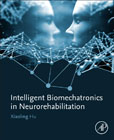
Intelligent Biomechatronics in Neurorehabilitation presents global research and advancements in intelligent biomechatronics and its applications in neurorehabilitation. As the aging population continues to grow, healthcare providers are faced with the challenge of developing long-term rehabilitation for neurological disorders such as strokes, Alzheimer's and Parkinson's diseases. Intelligent biomechatronics provide a seamless interface and real-time interactions with a biological system and the external environment, making them key to automation services. This book introduces the achievements in this field and discusses potential commercialization and clinical challenges of these technologies. Intelligent Biomechatronics in Neurorehabilitation covers the current understanding of the coding mechanisms in the nervous system from cellular level to system level, which have been or will be adopted in the design of the biological and robotic interfaces. Developed biomechatronic systems are introduced as successful examples to illustrate the fundamental engineering principles in the design. The third part of the book covers the clinical performance of biomechatronic systems in trial studies. Rehabilitation effectiveness and automatic evaluation by robotics will be demonstrated and discussed for potential long-term patient services Written by international experts in the rehabilitation and bioinstrumentation industriesCovers the current understanding of nervous system coding mechanisms, which are the bases for biological and robotic interfacesDemonstrates and discusses robotic rehabilitation effectiveness and automatic evaluation INDICE: Part I. Neural Coding Mechanisms 1. Neural Coding at Cellular Level 2. Neural Coding by Electrocorticography (ECoG) 3. Neural Coding by Electroencephalography (EEG) 4. Neuromuscular Coding by Electromyography (EMG) Part II. Biomechatronic Systems 5. Rehabilitation Robots with Brain Computer Interface (BCI) 6. Bionic Robotics for Amputees 7. Voluntary Intention Driven Rehabilitation Robots for the Upper Limb 8. Integration of Sensory Stimulation into Robot 9. Robotic and Functional Electrical Stimulation (FES) Hybrid System Part III. Clinical Applications and Commercialization 10. Clinical Evaluations by Robots in Rehabilitation 11. Clinical Trials on Rehabilitation with Voluntary Intention Driven Robots 13. Automation in Neurorehabilitation: Needs Addressed by Clinicians 14. Commercialization of rehabilitation robotics: Chances and Challenges 15. Comparison on the Rehabilitation Effectiveness between Trials and Real Services
- ISBN: 978-0-12-814942-3
- Editorial: Academic Press
- Encuadernacion: Rústica
- Páginas: 220
- Fecha Publicación: 01/11/2019
- Nº Volúmenes: 1
- Idioma: Inglés
